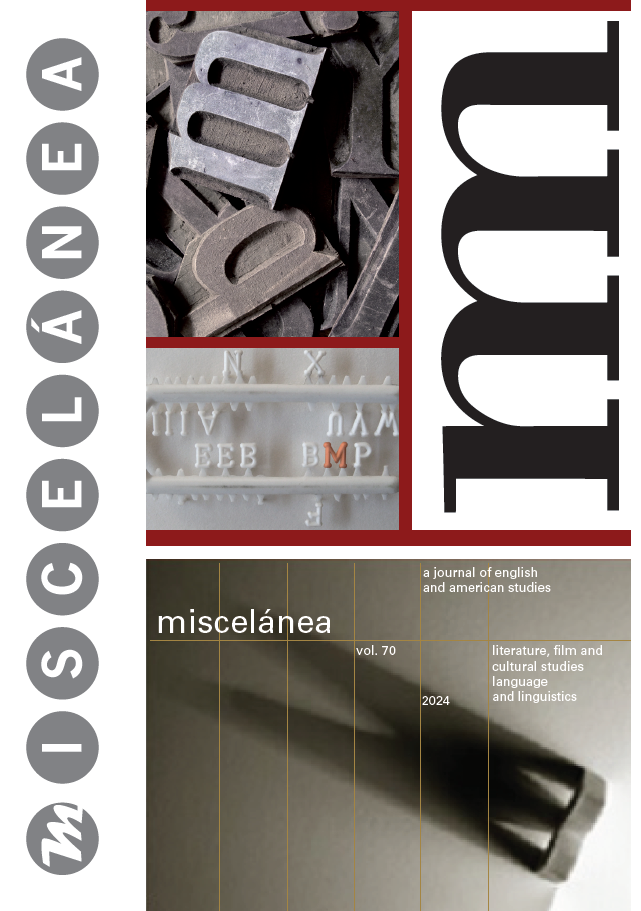Un estudio de corpus sobre el discurso político del Brexit: la modalidad a través de los modales léxicos
DOI:
https://doi.org/10.26754/ojs_misc/mj.20249837Palabras clave:
modalidad, modales léxicos, estudios del discurso asistido por corpus, discurso político, BrexitResumen
El objetivo de este trabajo es analizar los modales léxicos utilizados en los discursos políticos de Boris Johnson y Jeremy Corbyn durante los últimos meses del proceso del Brexit. Este estudio se centra en investigar si la elección léxica muestra el compromiso de los políticos con sus votantes, determinando qué modales léxicos utiliza cada político y qué implicación o implicaciones semánticas transmiten. El estudio es descriptivo e interpretativo y se ha realizado mediante la metodología del análisis del discurso asistido por corpus. Este artículo, al examinar otras clases de palabras diferentes a los verbos modales, contribuye a la investigación sobre la modalidad en la lengua inglesa. Como muestra el análisis del corpus, los políticos emplean los modales léxicos como un recurso destacado para presentar los hechos a la audiencia.
Descargas
Citas
ANANKO, Tatiana. 2017. “The Category of Evaluation in Political Discourse”. Advanced Education 4 (8): 128-137.
ARCANO, Clyde. 2020. “Corpus-Assisted Discourse Studies”. In Georgakopoulou, Alexandra and Anna De Fina (eds.) The Cambridge Handbook of Discourse Studies. Cambridge: Cambridge U.P.: 165-185. <https://doi.org/10.1017/9781108348195.009>.
BAKER, Paul. 2006. Using Corpora in Discourse Analysis. London and New York: Continuum.
BAKER, Paul. 2020. “Corpus-Assisted Discourse Analysis”. In Hart, Christopher (ed.) Researching Discourse: A Student Guide. London: Routledge: 124-142. <https://doi.org/10.4324/9780367815042-8>.
BNC Consortium. 2007. The British National Corpus, XML Edition. Oxford Text Archive. <http://handle.net/20.500.12024/2554>. Accessed October 30, 2022.
BREZINA, Vaclav. 2018. Statistics in Corpus Linguistics: A Practical Guide. Cambridge: Cambridge U.P. <https://doi.org/10.1017/9781316410899>.
BYBEE, Joan and Suzanne FLEISCHMAN. 1995. “Modality in Grammar and Discourse: An Introductory Essay”. Modality in Grammar and Discourse 14: 503-517.
CHENG, Maria. 2016. “The Power of Persuasion: Modality and Issue Framing in the 2012 Taiwan Presidential Debates”. Discourse and Society 27 (2):172-194.
DEPRAETERE, Ilse and Susan REED. 2020. “Mood and Modality in English”. In Aarts, Bas and April McMahon (eds.) The Handbook of English Linguistics. Oxford: Blackwell Publishing Ltd: 207-227.
DUNMIRE, Patricia L. 2012. “Political Discourse Analysis: Exploring the Language of Politics and the Politics of Language”. Language and Linguistics Compass 6 (11): 735-751.
EDELMAN, Murray. 1985. “Political Language and Political Reality”. PS: Political Science and Politics 18 (1): 10-19.
EKAWATI, Rosyida. 2019. “Power through Linguistic Modalities in Indonesian Presidential Speeches”. Discourse and Interaction 12 (1): 5-28. <https://doi.org/10.5817/DI2019-1-5>.
FAIRCLOUGH, Norman. 1989. Language and Power. London: Routledge.
FRADEJAS RUEDA, José Manuel. 2019. Cuentapalabras. Estilometría y análisis de textos con R para filólogos. <http://www.aic.uva.es/cuentapalabras>. Accessed May 25, 2022.
GISBORNE, Nikolas. 2007. “Dynamic Modality”. SKASE Journal of Theoretical Linguistics 4 (2): 44-61.
HARDIE, Andrew. 2012. “CQPweb – Combining Power, Flexibility and Usability in a Corpus Analysis Tool”. International Journal of Corpus Linguistics 17 (3): 380-409.
HUDDLESTON, Rodney. 1988a. English Grammar: An Outline. Cambridge: Cambridge U.P.
HUDDLESTON, Rodney. 1988b. Introduction to the Grammar of English. Cambridge: Cambridge U.P.
HUDDLESTON, Rodney and Geoffrey K. PULLUM. 2002. The Cambridge Grammar of the English Language. Cambridge: Cambridge U.P.
HUDDLESTON, Rodney, Geoffrey K. PULLUM and Brett REYNOLDS. 2021. A Student’s Introduction to English Grammar. Cambridge: Cambridge U.P.
KILGARRIFF, Adam, Vít BAISA, Jan BUŠTA, Miloš JAKUBÍČEK, Vojtěch KOVÁŘ, Jan MICHELFEIT, Pavel RYCHLÝ and Vít SUCHOMEL. 2014. “The Sketch Engine: Ten Years on”. Lexicography 1 (1): 7-36. <https://doi.org/10.1007/s40607-014-0009-9>.
KHOMUTOVA, Tamara N. 2014. “Mood and Modality in Modern English”. Procedia: Social and Behavioral Sciences 154: 395-401.
MARTIN, James andPeter WHITE. 2007. The Language of Evaluation: Appraisal in English. London: Palgrave Macmillan.
MORLEY, John. 2011. “Introduction. A Description of CorDis”. In Morley, John (ed.) Corpus-Assisted Discourse Studies on the Iraq Conflict: Wording the War. London: Routledge: 1-11.
NUYTS, Jan. 2016. “Surveying Modality and Mood”. In Nuyts, Jan and Johan Van Der Auwera (eds.) The Oxford Handbook of Modality and Mood. Oxford: Oxford U.P.: 31-49.
ORREQUIA-BAREA, Aroa and Encarnación ALMAZÁN-RUIZ. 2021. “Modelling through Modality: (Re)shaping Brexit”. ES Review. Spanish Journal of English Studies 42: 127-153. <https://doi.org/10.24197/ersjes.42.2021.127-153>.
PALMER, Frank Robert. (1988) 2001. Mood and Modality. Cambridge: Cambridge U.P.
PALTRIDGE, Brian. 2012. Discourse Analysis: An Introduction. London: Bloomsbury Publishing.
PARTINGTON, Alan. 2004. “Corpora and Discourse, a Most Congruous Beast”. Corpora and Discourse 1: 11-20.
PARTINGTON, Alan, Alison DUGUID and Charlotte TAYLOR. 2013. Patterns and Meanings in Discourse: Theory and Practice in Corpus-Assisted Discourse Studies (CADS). Amsterdam / Philadelphia: John Benjamins Publishing.
QUIRK, Randolph, Sidney GREENBAUM, Geoffrey LEECH and Jan SVARTVIK. 1985. A Comprehensive Grammar of the English Language. London: Longman.
RAYSON, Paul. “Log-likelihood and Effect Size Calculator”. <https://ucrel.lancs.ac.uk/llwizard.html>. Accessed February 27, 2024.
ROZUMKO, Agata. 2019. Modal Adverbs in English and Polish. A Functional Perspective. Białystok: Wydawnictwo Uniwersytetu w Białymstoku.
SIMON-VANDENBERGEN, Anne-Marie. 1996. “Image-Building through Modality: The Case of Political Interviews”. Discourse and Society 7 (3): 389-415.
SIMON-VANDENBERGEN, Anne-Marie. 1997. “Modal (Un)certainty in Political Discourse: A Functional Account”. Language Sciences 19 (4): 341-356.SOMAI, Miklós and Zsuzsanna BIEDERMANN. 2016. “Brexit: Reasons and Challenges”. Acta Oeconomica 66: 137-156.
TAYLOR, Charlotte and Anna MARCHI. 2018. Corpus Approaches to Discourse. A Critical Review. London: Routledge.
TORRECUADRADA GARCÍA-LOZANO, Soledad and Pedro GARCÍA FUENTE. 2017. “¿Qué es el Brexit? Origen y posibles consecuencias”. Anuario Mexicano de Derecho Internacional 17: 3-40.
TRAUGOTT, Elizabeth Closs. 2011. “Modality from a Historical Perspective”. Language and Linguistics Compass 5 (6): 381-396.
Descargas
Publicado
Cómo citar
Número
Sección
Licencia
Derechos de autor 2024 Encarnación Almazán Ruiz, Aroa Orrequia-Barea

Esta obra está bajo una licencia internacional Creative Commons Atribución-NoComercial 4.0.
Aceptado 2024-05-14
Publicado 2024-12-16


